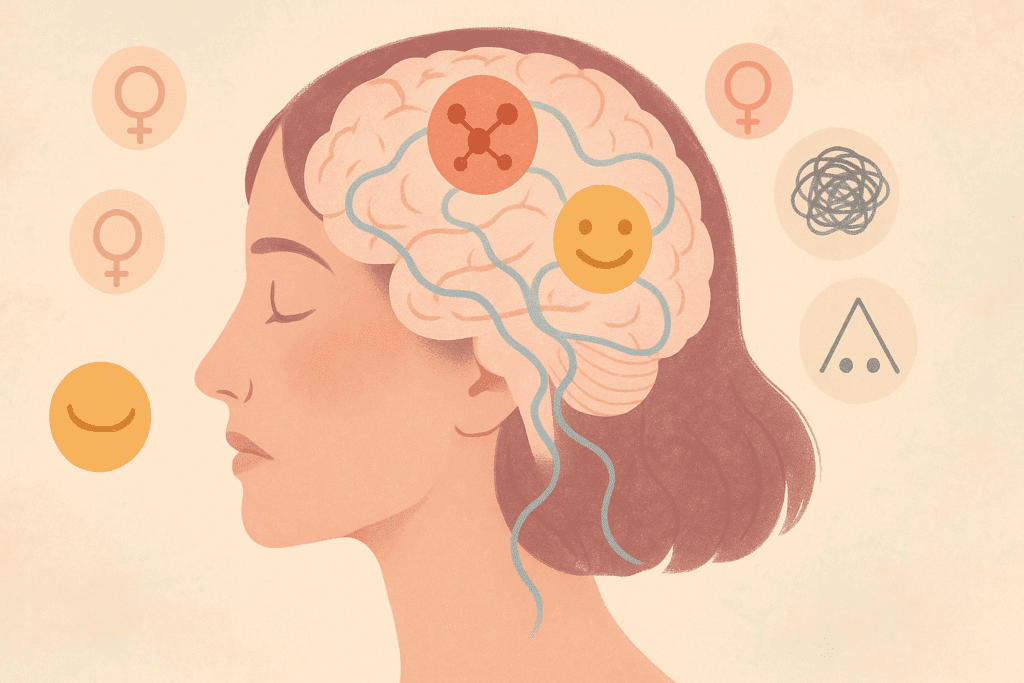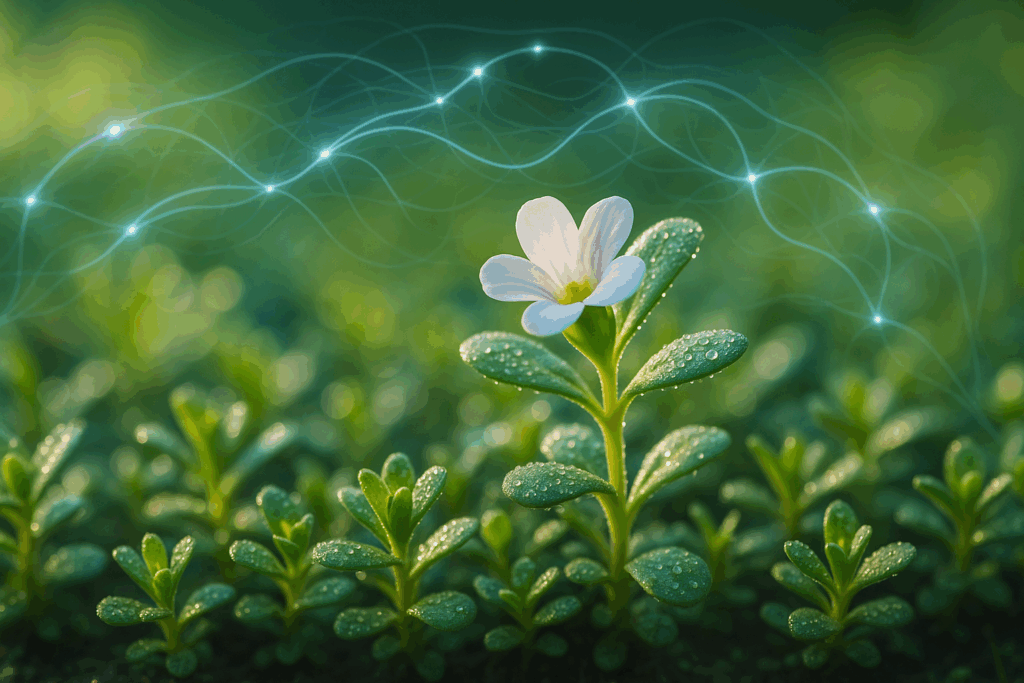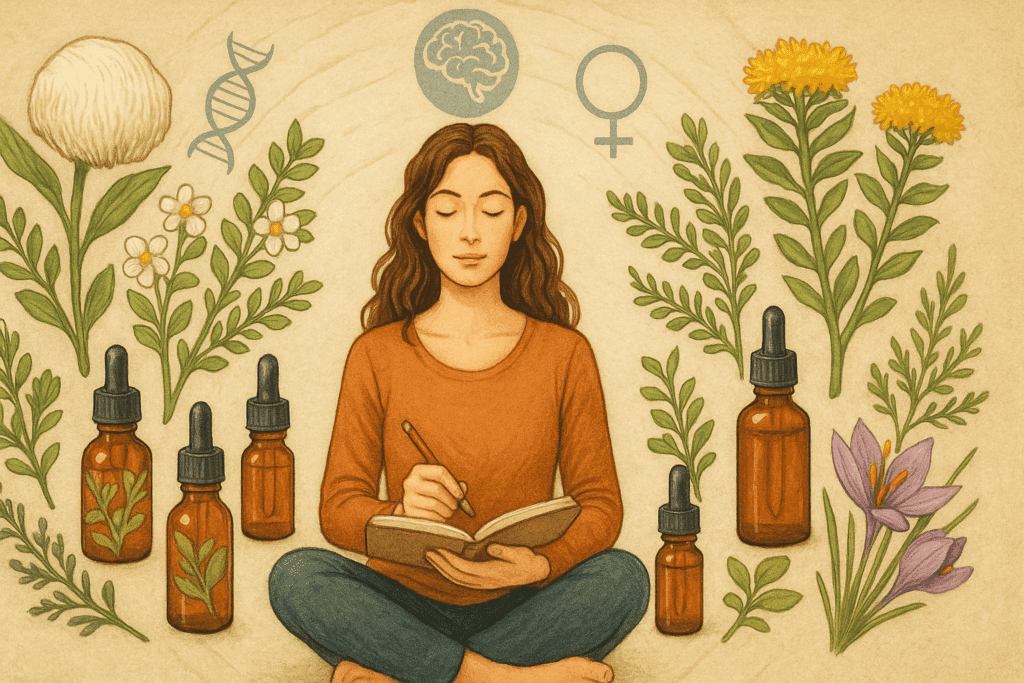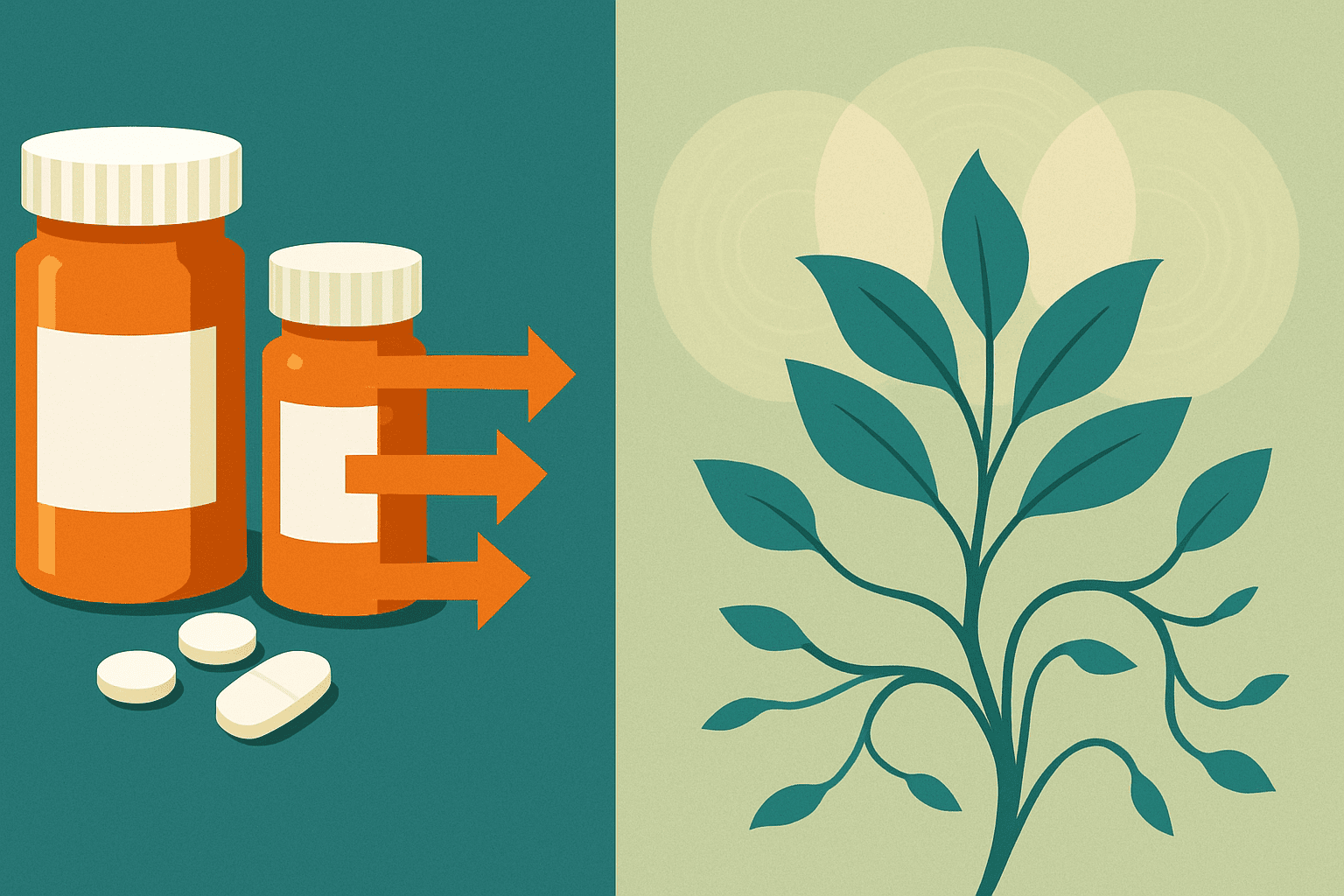Attention-deficit/hyperactivity disorder (ADHD) affects millions of people globally, yet treatment strategies remain highly individualized and complex. While pharmaceutical interventions are a cornerstone of ADHD management, especially for severe symptoms, many individuals seek natural alternatives to complement or reduce reliance on medication. In recent years, herbs for ADHD in women and natural compounds targeting cognitive clarity have received growing attention. This article explores the best herb for ADHD through the lens of emerging science, holistic care, and individualized needs—particularly for women, who are often underdiagnosed and undertreated. We also examine how these remedies support memory and study skills, reduce fatigue-related cognitive symptoms, and enhance overall brain function.
You may also like: Best Herb for ADHD Support: How Natural Remedies and Herbs for ADHD Women May Help Boost Focus and Calm
Understanding ADHD in Women: A Unique Neurobiological Profile
The presentation of ADHD in women often differs from the stereotypical hyperactive male profile. Women tend to experience more internalized symptoms such as inattentiveness, anxiety, and emotional dysregulation. These symptoms are frequently overlooked or misattributed, contributing to delays in diagnosis and treatment. Complicating matters further, hormonal fluctuations throughout the menstrual cycle, pregnancy, and menopause can significantly impact symptom intensity. Thus, selecting the best herb for ADHD must consider this dynamic hormonal environment.
Incorporating plant-based remedies into ADHD care is not new. Historically, herbal medicine has played a role in cognitive support, emotional regulation, and attention enhancement. Today, modern research is beginning to validate what traditional systems have known for centuries. Herbs like Ginkgo biloba, Bacopa monnieri, and Rhodiola rosea are gaining traction not only as general cognitive enhancers but also as promising aids for study skills memory techniques and managing fatigue memory loss.

Why Natural Remedies Appeal to ADHD Populations
The appeal of herbal interventions for ADHD lies in their potential to mitigate symptoms without the harsh side effects often associated with stimulant medications. Many women report extreme fatigue and memory loss as part of their ADHD experience or as side effects from medications. Natural compounds that address these symptoms while also supporting memory and brain function are particularly attractive. Unlike synthetic drugs, which often work on isolated neural pathways, herbs tend to act on multiple systems simultaneously. This multitarget approach may offer a broader, more nuanced form of support.
Moreover, cultural shifts toward holistic and integrative medicine have encouraged greater public interest in plant-based remedies. The rise of functional medicine and biohacking communities further amplifies the desire to explore the best herb for ADHD that also enhances memory and brain resilience. Especially among college students and professionals seeking cognitive optimization, memorization techniques for studying are increasingly coupled with natural nootropic stacks.
Bacopa Monnieri: An Ancient Herb for Modern Focus
One of the most well-researched herbs for ADHD in women is Bacopa monnieri, a staple of Ayurvedic medicine. Bacopa is known for its adaptogenic properties and its ability to enhance memory, reduce anxiety, and increase attentional capacity. What makes Bacopa especially appealing for study skills memory techniques is its influence on synaptic communication and neuroplasticity. Several double-blind, placebo-controlled studies have shown that Bacopa improves working memory, verbal learning, and delayed recall—all crucial for academic success.
Bacopa works by enhancing the expression of brain-derived neurotrophic factor (BDNF) and modulating the activity of neurotransmitters like serotonin and dopamine, which are often imbalanced in ADHD. This dual action makes it particularly effective for women experiencing both inattentiveness and emotional instability. Since many people with ADHD report tired and memory loss as part of their symptom profile, Bacopa’s energizing yet calming effects can be highly beneficial.
It is important, however, to consider dosing and preparation. Bacopa is most effective when taken consistently over several weeks, as its effects are cumulative rather than immediate. Users should opt for standardized extracts containing a minimum of 20% bacosides, the active compound responsible for its nootropic effects. Those studying memory and brain function in clinical settings have repeatedly cited Bacopa as one of the most promising botanical interventions available.

Rhodiola Rosea: A Natural Ally Against Fatigue and Focus Challenges
Another standout in the search for the best herb for ADHD is Rhodiola rosea, an adaptogen native to Arctic regions. It is particularly effective in combating fatigue and cognitive dysfunction caused by stress. For women managing ADHD alongside high levels of emotional or occupational stress, Rhodiola offers a viable solution. Its mechanisms include modulation of cortisol levels, enhancement of mitochondrial energy production, and improved neurotransmitter balance.
In studies examining fatigue memory loss and tiredness and memory loss, Rhodiola consistently demonstrates improvements in mental stamina, reaction time, and concentration. While it may not directly increase attention span in the same way as stimulants, it supports the mental endurance necessary for sustained cognitive effort. This makes it a valuable tool for those developing memorization techniques for studying or seeking ways to improve memory for studying.
Importantly, Rhodiola has a fast onset of action, with noticeable effects often occurring within the first week of use. This is especially helpful for individuals needing immediate support during high-demand periods such as academic exams or project deadlines. As with all adaptogens, Rhodiola should be cycled periodically to maintain its efficacy and avoid desensitization.
Ginkgo Biloba: A Time-Tested Remedy for Cognitive Enhancement
Ginkgo biloba, derived from one of the oldest tree species on Earth, has long been studied for its effects on cognitive function and vascular health. Its benefits stem from its ability to enhance cerebral blood flow, modulate neurotransmitter systems, and protect neurons from oxidative stress. These attributes make it a popular option among herbs for ADHD in women, especially those experiencing brain fog, mental fatigue, and concentration difficulties.
In memory studies conducted on both healthy adults and individuals with cognitive impairments, Ginkgo has shown improvements in short-term memory, processing speed, and attentional control. These enhancements are not only relevant for managing ADHD symptoms but are also valuable for anyone employing study skills memory techniques or exploring how to improve memory for studying.
Ginkgo’s neurovascular benefits are particularly noteworthy for women experiencing hormonal fluctuations that affect brain function. It may also reduce symptoms of PMS-related brain fog and support cognitive clarity during perimenopause. Given that memory and brain function are deeply influenced by blood flow and oxygenation, Ginkgo’s mechanism of action directly addresses some of the core neurobiological deficits associated with ADHD.

Lion’s Mane Mushroom: A Nerve-Regenerating Nootropic
Although technically a fungus and not an herb, Lion’s Mane (Hericium erinaceus) earns its place in this discussion due to its profound impact on nerve regeneration and cognitive performance. Rich in compounds like hericenones and erinacines, Lion’s Mane stimulates the synthesis of nerve growth factor (NGF), a protein crucial for the maintenance and survival of neurons. This makes it an excellent candidate for supporting memory and brain function in both neurotypical individuals and those with ADHD.
Women experiencing extreme fatigue and memory loss often report improvement after consistent use of Lion’s Mane, especially when used as part of a broader regimen including other adaptogens and nootropics. Research indicates that it enhances hippocampal neurogenesis and may counteract the cognitive decline associated with stress and aging. These findings have direct implications for those seeking natural ways to sharpen focus, develop memorization techniques for studying, and reduce brain fog.
Lion’s Mane also appears to modulate the gut-brain axis, which is of increasing interest in ADHD research. Many individuals with ADHD also experience gastrointestinal issues, which may influence neurotransmitter synthesis and absorption. By promoting a healthy microbiome and reducing systemic inflammation, Lion’s Mane provides multi-layered support for cognitive wellness.

Saffron: A Bright Spice for Mood and Motivation
While less commonly associated with ADHD, saffron (Crocus sativus) has shown remarkable promise in improving attention and emotional balance. Several randomized controlled trials have demonstrated that saffron extract can significantly reduce symptoms of inattention and hyperactivity in both children and adults. This effect is thought to be mediated by its ability to inhibit the reuptake of dopamine and serotonin, similar to how certain antidepressants function.
For women with ADHD who also experience mood swings or symptoms of depression, saffron offers a twofold benefit. It not only sharpens focus but also elevates mood, reducing the emotional volatility that often accompanies ADHD. These effects are particularly useful for improving study skills memory techniques by fostering a more stable and receptive mental state.
Saffron also contains potent antioxidants such as crocin and safranal, which support neuroplasticity and reduce oxidative stress. This neuroprotective action makes it suitable for long-term cognitive health. For those battling tiredness and memory loss, saffron may offer a bright, natural lift without the jittery side effects associated with caffeine or stimulants.

Frequently Asked Questions: Best Herbs for ADHD in Women and Cognitive Support
What makes herbs effective for supporting ADHD symptoms in women specifically?
Herbs that support ADHD symptoms in women often work best when they account for hormonalfluctuations and neurochemical imbalances unique to female physiology. While men and women share core symptoms, women frequently experience more internalized effects, such as emotional dysregulation and fatigue, which can impact their memory and focus. Adaptogenic herbs like Rhodiola rosea and Bacopa monnieri not only help stabilize mood and energy but also enhance memory and brain function in hormonally sensitive states. Additionally, when used alongside study skills memory techniques, these herbs may help women develop stronger mental stamina and resilience. The key is choosing herbs that support both the cognitive and emotional components of ADHD while providing room for personalized memorization techniques for studying.
Can herbal remedies improve both memory and attention span for studying purposes?
Yes, many herbs used to support ADHD symptoms also enhance learning capacity, attention span,and memory retention. For instance, Lion’s Mane mushroom stimulates nerve growth factor, which may support new neural connections—an essential component of long-term memory. When paired with focused study skills memory techniques, this can lead to marked improvement in how efficiently information is processed and stored. Similarly, Ginkgo biloba improves cerebral blood flow, which supports attentional control during academic tasks. Students looking into how to improve memory for studying may benefit from combining these herbal supports with consistent memorization techniques for studying over time.
How can herbal strategies be used to complement traditional study skills?
Herbs can be used to enhance the physiological conditions required for effective learning. Forexample, using Bacopa monnieri to support cognitive clarity can make memorization techniques for studying more effective by increasing synaptic plasticity and neurotransmitter efficiency. Likewise, herbs that reduce stress and fatigue, like Rhodiola rosea, can increase mental endurance, allowing for longer periods of deep work. These effects directly enhance how to improve memory for studying because they sustain energy and promote sharper focus during recall and learning tasks. By integrating these herbs into a routine that also includes structured study skills memory techniques, users can maximize the benefits of both approaches.
Are there any risks associated with combining multiple herbs for ADHD and memory?
While herbal combinations can be highly effective, they must be approached with care to avoidpotential interactions or overstimulation. For instance, stacking adaptogens like Rhodiola with stimulating herbs may lead to restlessness or sleep disturbances if not dosed properly. Women using herbs to support ADHD should also consider how these compounds interact with their hormonal cycles. Consulting a knowledgeable practitioner is essential, especially when integrating herbs into a protocol focused on how to improve memory for studying or other cognitive enhancement goals. Remember, even natural compounds can be powerful when combined, so tailor stacks to support both memory study goals and overall well-being.
Can lifestyle changes boost the effectiveness of herbal remedies for ADHD and memory?
Absolutely. Diet, sleep, exercise, and stress management play key roles in determining how well herbal remedies perform. For example, pairing a healthy anti-inflammatory diet with herbs thatenhance memory and brain function can amplify neuroprotective effects. Physical activity boosts BDNF, which works synergistically with herbs like Bacopa to support synaptic health—a critical factor when applying study skills memory techniques. Prioritizing high-quality sleep and mindfulness practices also supports cognitive clarity, reinforcing memorization techniques for studying. A holistic approach that includes both herbal and lifestyle strategies offers the strongest path toward cognitive improvement.
What time of day is best for taking herbs aimed at memory and studying?
Timing can significantly impact the effectiveness of herbal supplements. Herbs like Rhodiola roseaare best taken in the morning or early afternoon due to their energizing effects, while Bacopa monnieri may be better suited for evening use because of its calming influence. When using these herbs in conjunction with study skills memory techniques, it helps to align them with high-focus periods in your daily schedule. If your goal is to learn how to improve memory for studying at night, choose herbs that promote calm concentration without overstimulation. Conversely, if your memorization techniques for studying are used during early study sessions, adaptogens that enhance wakefulness and alertness are ideal.
Do certain herbs work better for specific ADHD subtypes?
Yes, specific herbs may align more closely with the three ADHD subtypes: inattentive, hyperactiveimpulsive, and combined. For inattentive types, herbs like Bacopa and Lion’s Mane are particularly helpful due to their effects on memory and processing speed. Hyperactive individuals may benefit more from calming herbs like Passionflower or Lemon Balm. For those with combined-type ADHD, a blend of focus-enhancing and anxiety-reducing herbs often proves most effective. This tailored approach can significantly enhance the success of study skills memory techniques and increase the efficacy of memorization techniques for studying based on individual symptom patterns.
How long does it typically take to see results from herbal strategies for memory
improvement? Herbal remedies often require consistent use over several weeks to months beforefull effects are noticeable. For example, Bacopa monnieri typically requires 4 to 6 weeks of daily supplementation to show significant benefits in memory and cognitive clarity. However, some herbs like Rhodiola may offer quicker results within days, especially for reducing fatigue that interferes with study routines. The gradual buildup enhances the ability to retain and apply study skills memory techniques over time. Patience and consistency are essential for those seriously exploring how to improve memory for studying through natural means.
Can herbs help with test anxiety and emotional overwhelm during academic stress?
Many herbs known for ADHD support also have anxiolytic properties that ease test anxiety andperformance-related stress. Herbs like Ashwagandha and Saffron have demonstrated ability to regulate cortisol and stabilize mood, which can be especially helpful during high-pressure study periods. Reducing anxiety helps learners access previously stored information more effectively, which complements memorization techniques for studying. Managing emotional overload not only improves academic performance but also supports long-term retention. As anxiety often hinders the application of study skills memory techniques, integrating calming herbs can provide a crucial edge.
What should I look for when choosing a high-quality herbal supplement for ADHD or memory support?
Select products that are third-party tested, contain standardized extracts, and clearly list theconcentration of active ingredients like bacosides or salidrosides. Avoid proprietary blends that mask ingredient amounts and opt for transparent labeling. Quality matters significantly when trying to enhance memory and brain function, especially in the context of structured academic routines. For those focused on how to improve memory for studying, it’s critical to choose supplements that deliver consistent results and have clinical backing. Also consider brands that align with your personal values, whether it’s organic sourcing, sustainability, or practitioner-grade standards.

The Importance of Personalized Herbal Strategies for ADHD in Women
While many herbs show promise in managing ADHD symptoms, it is crucial to recognize that what works well for one individual may not work for another. Women, in particular, require a personalized approach due to hormonal influences, comorbid conditions like anxiety or depression, and metabolic differences. Working with a qualified integrative health practitioner can help identify the most appropriate herbal combinations and dosages.
Effective strategies often involve stacking two or more herbs to target multiple aspects of ADHD. For instance, combining Bacopa with Rhodiola may offer both long-term memory support and short-term energy enhancement. Similarly, Ginkgo and Lion’s Mane together may improve cerebral circulation while simultaneously promoting nerve regeneration. These synergistic effects can be especially useful for students or professionals implementing memorization techniques for studying and looking to optimize brain performance.
Timing, form, and quality of the herbs also play a vital role. Standardized extracts, third-party testing, and clear labeling are essential markers of quality. Some herbs may work better in tincture form for rapid absorption, while others are more effective as capsules for slow release. Personalized attention to these details enhances both the safety and efficacy of natural interventions.
Was this article helpful? Don’t let it stop with you. Share it right now with someone who needs to see it—whether it’s a friend, a colleague, or your whole network. And if staying ahead on this topic matters to you, subscribe to this publication for the most up-to-date information. You’ll get the latest insights delivered straight to you—no searching, no missing out.
Further Reading:
ADHD and Complementary Health Approaches: What the Science Says


